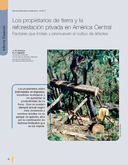| dc.contributor.author | Könönen, A.M. | |
| dc.contributor.author | Leppänen, K.J. | |
| dc.date.accessioned | 2015-03-19T21:49:45Z | |
| dc.date.available | 2015-03-19T21:49:45Z | |
| dc.date.issued | 2004-11 | |
| dc.identifier.issn | e-ISSN: 1659-1216 | es_EN |
| dc.identifier.uri | https://repositorio.catie.ac.cr/handle/11554/6514 | |
| dc.identifier.uri | 466778 | es_ES |
| dc.description.abstract | Las razones de la falta de participación de parte de la población local en las iniciativas de reforestación son desconocidas mundialmente. Para explorar la realidad centroamericana, se entrevistó en Guatemala, Honduras, El Salvador, Nicaragua, Costa Rica y Panamá a un total de 621
propietarios de tierra, de los cuales 324 habían sembrado
árboles y 297 no lo habían hecho. El análisis revela que en
cuanto a sus características personales, los no reforestadores son iguales a los reforestadores: el sexo, la edad, la
cantidad de hijos y el nivel de educación formal no explican estadísticamente las diferencias en su decisión de reforestar. El nivel de conocimiento y actitud hacia las plantaciones forestales tampoco la explican; reforestadores y
no reforestadores están igual de concientes de los beneficios de los árboles y tienen una actitud igual de positiva
hacia las plantaciones forestales. Si dependiera solamente de actitud e interés, la gran mayoría de propietarios de
tierra en Centroamérica sembraría árboles. Las mayores limitaciones a la reforestación mencionadas por los entrevistados son: escasez de terreno disponible, incompatibilidad de árboles con otros usos, largo tiempo de rotación
y escasez de recursos financieros para la inversión inicial.
Las mayores diferencias entre los dos grupos se dan en
relación con los terrenos: los reforestadores tienen, en promedio, fincas más grandes, más productivas y más cercanas a los centros poblados.
Los resultados de estas entrevistas contradicen varias
concepciones comunes sobre los obstáculos para la reforestación. La tenencia de la tierra no es tan importante como se creía, y los reforestadores tampoco resultaron excepcionalmente “innovadores”. La literatura afirma que a
los campesinos centroamericanos les falta conciencia ambiental; sin embargo, se encontró que la población tiene
un alto nivel de conocimiento sobre la importancia de los
árboles, tanto local como globalmente, y que la resistencia
hacia los árboles es mínima. Las implicaciones prácticas
de estos resultados son importantes. La educación pública por sí sola no puede aumentar la reforestación, sino se
necesitará integrar los árboles a cada tamaño y tipo de finca y aumentar el atractivo económico de los árboles, en
relación con otros cultivos. Los árboles son bienvenidos
en las fincas privadas de Centroamérica, siempre y cuando contribuyan a la producción y a la seguridad económica de la familia. | es_ES |
| dc.description.abstract | The reasons for the lack of public
participation in tree planting initiatives in the developing
countries have been widely unknown. To explore the
reality in Central America, personal interviews were made
in the region to 621 landholders, of which 324 had planted
trees on their lands and 297 had not. The results indicate
that in respect to their personal characteristics both groups
of farmers were very similar. Tree farmers do not differ in
gender, age, education or family size from the non-tree
farmers, nor do they have significantly different attitudes or
knowledge. If it were to depend purely on willingness, the
vast majority of the Central American landholders would
plant trees. The main obstacles mentioned in the
interviews were: lack of available land, incompatibility with
other land uses, long payback period and difficulties in
financing the initial investment. The main differences
between the groups indeed lie in their landholdings. The
tree farmers possess considerably larger and better
producing farms on better land, located closer to centres
than the non-tree farmers.
These findings challenge many common views. Tenure of
land did not rise as a determining factor and the tree
farmers did not come out as particular “innovators”. It is
evident that a claimed lack of knowledge, or ignorance, is
not a sound explanation to tree planting inertia. On the
contrary the Central American landholders proved to be
very conscious of the importance of trees both locally and
globally, and there is virtually no resistance or negative
attitudes. The economic factors were, however, found
relevant; land and capital are scarce. The inertia to on-farm
tree planting is not caused by landholders not knowing why
they should plant trees, but instead of lacking the
resources to act according to this insight. The practical
implications of these findings are important. Public
education alone cannot increase tree planting, instead the
integration of trees to all sizes and types of farms is
necessary. It is also important to seek ways to increase the
economic profitability of trees, relative to other crops.
Trees are welcomed on private farms in Central America,
only if they contribute to the production and economic
security of the farmer household. | |
| dc.format.extent | 10 páginas | |
| dc.format.mimetype | pdf | |
| dc.language.iso | es | es_ES |
| dc.publisher | CATIE, Turrialba (Costa Rica) | es_ES |
| dc.publisher | CATIE, Turrialba (Costa Rica) | |
| dc.relation.ispartof | Recursos Naturales y Ambiente Número 43 (Noviembre 2004), páginas 18-27 | |
| dc.rights.uri | https://creativecommons.org/licenses/by-nc-nd/4.0/ | |
| dc.subject | PROPIEDAD DE LA TIERRA | |
| dc.subject | TENENCIA | |
| dc.subject | PROPIEDAD PRIVADA | |
| dc.subject | REFORESTACION | |
| dc.subject | AMERICA CENTRAL | |
| dc.subject | REFORESTACION | |
| dc.subject | PLANTACIONES | |
| dc.subject | PLANTACION FORESTAL | es_ES |
| dc.title | Los propietarios de tierra y la reforestación privada en América Central: factores que limitan y promueven el cultivo de árboles | es_ES |
| dc.type | Artículo | es_ES |
| dc.journal.issueNumber | 43 | |
| dc.journal.pages | 18-27 | |



